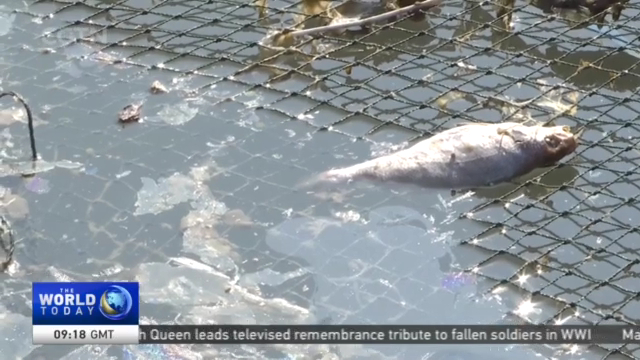
17:43, 11-Nov-2018
Quanzhou Chemical Leak: Locals face huge economic losses
Updated
17:08, 14-Nov-2018
02:10

It's been a week since nearly seven tons of chemicals leaked into the sea in southeastern China. While most of the spill has been cleaned up, locals now face huge economic losses. Xu Xinchen has more.
Xiao Jianxin has spent his entire life fishing in Xiaocuo village. Like his peers, fishing is the biggest source of income. However, after nearly 7 tons of C9 aromatic hydrocarbons leaked into surrounding waters, his farm has been wiped out.
XIAO JIANXIN LOCAL FISHERMAN "We cannot sell any of the fish by year's end."
Xiao says over 100 tons of his fish have been affected — some escaped, some died and the rest are contaminated. What he is facing now is the prospect of zero income for the year.
CHN MALE XIAO JIANXIN LOCAL FISHERMAN "For those contaminated fish, we hope that the relevant authorities can buy them back and dispose of them if necessary."
Luckily, the local government has been registering farmers' damages.
DONE XU XINCHEN XIAOCUO VILLAGE, QUANZHOU, FUJIAN PROVINCE "This is my third day here, a village only a few hundred meters away from the spill site, the chemical odor is a lot softer now. But all fish farmers in this village. The 99 of them have reported losses."
Yet, more evaluations are still needed for any compensation to be paid out. Now, market regulators have banned people from catching, selling and eating fish from Xiaocuo village. However, the fear among local residents is affecting seafood markets across the region.
CHN MALE ZHUANG JINGHUI SEAFOOD RETAILER "After the chemical leak, no matter where we get our seafood — from Guangdong and other regions in Fujian, people are still scared and will not buy."
CHN MALE QIU ZONGJIN DISTRICT MARKET REGULATOR "The ban will remain active until further notices from marine fishing authorities are provided. They've been testing samples."
It could take at least three weeks before results come back. Experts say the contaminated seawater has no effects on drinking water. With 65% of households here relying on fishing, this winter in Xiaocuo village — despite its mild temperature — could be tougher than ever. Xu Xinchen, CGTN, Quanzhou, Fujian Province.

SITEMAP
Copyright © 2018 CGTN. Beijing ICP prepared NO.16065310-3
Copyright © 2018 CGTN. Beijing ICP prepared NO.16065310-3